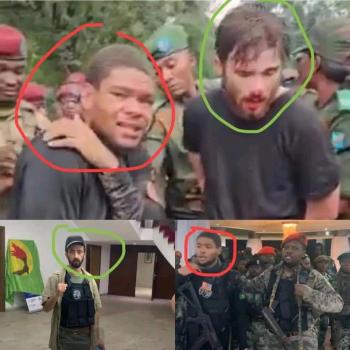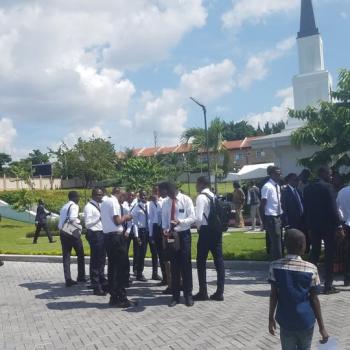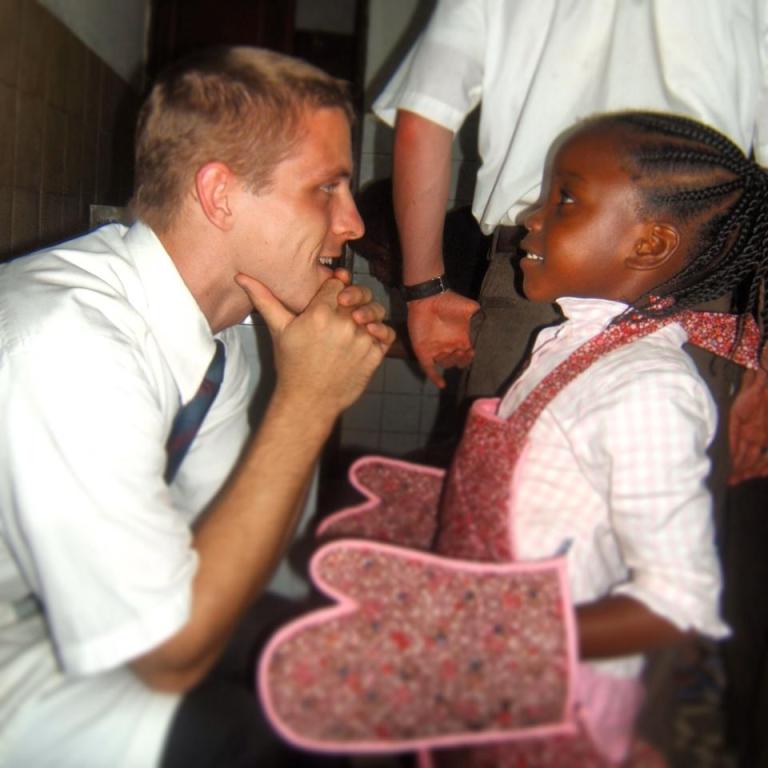There is no faith without imagination. One reason I choose Mormonism as my religious framework is that–at its best–it urges me to the most noble imaginings. So much of my life involves imagination.
I have taught poets who had far greater gifts than I, essayists who invited me into new paradigms or experiences, and fiction writers who took me on unanticipated journeys. Recently, I taught a young man who I also knew as a missionary. He was in the MTC branch my husband and I served in several years ago. He went to the DR-Congo, Africa, and I wrote to him (and to several others) during the whole of their missions.
Though my letters to the other missionaries were primarily faith-building, my letters to him were often pure fiction. He knew that every fictional claim I made required him to match or beat it—and it made p-day extra fun for him. (That was my intent, of course). We had an ongoing story about his chimpanzee companion, Mr. Stompsalot, and I reported on the missionary project which was abandoned in 1973. The MMP (Monkey Missionary Program) trained chimps in the various discussions, which were scripted and memorized at the time. However, if the investigator gave an off-script answer, the monkeys reacted unpredictably, and sometimes violently. Of course, the program was dropped—immediately after one of the chimps threw a pitcher of water at an Argentine ambassador who said, “What’s in it for me?” rather than “You mean there was a pre-existence?”
And thus we played with elements of IMAGINATION throughout his mission.
Of course, my letters to him were not exclusively fiction. There were some serious, maternal ones as he faced the challenges most missionaries face, and some challenges unique to those serving in Africa. In these exchanges, I soon saw that this imaginative young man also had remarkable spiritual gifts: faith and healing. He reported some miracles I’ll allude to only vaguely here, and described them as “cool.” I contemplated his spiritual gifts as extensions of his imagination—meaning that because he was capable of imagining all sorts of possibilities, he did not limit his faith to what might be “reasonably expected.” Could he lay his hands on somebody’s head and, by virtue of the priesthood and faith, heal him when the doctors had pronounced the case hopeless?
Yes. He could. He did.
In 1 Nephi 11, Nephi wants to understand his father’s dream, and is provided the ultimate instructor: the Spirit of the Lord. Before any teaching can happen, however, Nephi must declare his “willing suspension of disbelief.” (That’s Coleridge. The scriptures [1 Nephi 11: 4-5] state that Nephi is asked if he believes his father’s words, and answers “Thou knowest I believe…”). No unfolding of the plot can happen unless the seeker (or reader) first believes.
We can come up with all sorts of scriptural examples of disbelief stopping the plot of a miracle, and of belief unfolding wonders.
Peter, do you believe you can walk on water?
Blind man, wilt thou be made whole?
Peter, whom say ye that I am?
As this young man became my student, I trained him in some of the elements of fiction, all of which require a fertile imagination and a generous, loving heart. Yes, I believe that love is a part of good writing just as it is the FOUNDATION of faith. (Faith, says Paul in Galatians 5:6, “worketh by love.”)
A good writer must love her characters and honor their complexity and quirks. She must love words and images, her tools. She must love writing itself, because she will be required to re-write and re-write if she is ever to become good.
I demanded a lot of my RM student. I had FAITH in his ability to create excellent writing. I insisted on revisions and never let him get away with coasting through an assignment. I believed in him far too much to do him such a disservice.
By the end of the semester, I knew not only this young man, but all of my students pretty well. I loved them, and I wanted them to love each other. I wanted them to feel that we were a family, exploring a brave new world and reporting our findings, continually surprised by joy. I demanded that they look at their surroundings more carefully, and often opened class with the question, “What have you seen with your poetic eyes?”
I wanted them to find mentors among the fine writers in the established canon and in contemporary literature. I also frequently asked, “Who have you fallen in love with lately?”—referring to the authors just waiting to be given a chance, a first date, maybe even a little NCMO session (which is only a problem if you leave lipstick stains on the pages).
In the fiction unit, I asked relentlessly “Why should I care?” as I urged my students to deepen their characters and plots.
All three of these questions have spiritual elements and urge the imagination to “enlarge thy borders forever” (Moroni 10:31).
What have I seen with my poetic eyes? Have I let metaphor move me from the mundane to the magnificent? Have I marveled at something and given thanks? (Jesus gave thanks for the seemingly paltry offering of five loaves and two fishes, before the miracle multiplied them.)
Who have I fallen in love with lately? Well, in the literary world, I am having a fictional affair with Ethan Canin. In my literal life, I fell in love with my husband again yesterday when he took me on a romantic getaway to Homestead, Utah, and we sat in our pajamas in a dimly lit gazebo just after dusk. Tufts of daffodils surrounded us, and we simply held hands.
Why should I care about any of this? Because I believe in THE WORD as a transformative power. I believe that a young man or woman can speak certain words with faith and love and begin a miracle—whether those words command sightless eyes to see, or whether they open someone’s mind to a new world , or a previously uncontemplated paradigm. Our words can instruct, delight, and heal. They can enlarge the soul.
Can we have faith without imagination?
I don’t think we can. In the LDS religion, we imagine ourselves and others as priests, priestesses, even gods. We imagine ourselves in a garden, and in a wilderness. We imagine ourselves entering Heaven. If we are living the gospel as we should, we imagine everyone else as limitless, and we refrain from boxing them into a finite identity which would shrink their possibilities.
I have seen my children reveal themselves as resplendent beings even during their most difficult moments, and I imagine that there is more revelation to come. I have faith in that. I am glad to be associated with LDS writers and film makers who imagine amazing things and learn how to share them vividly. I am honored that I get to teach a few of them—those I have known in other contexts, and those who I meet on the first day of class. Their gifts are ALMOST unimaginable.
Two weeks ago, I drove with this former student/RM and his wife (I lined them up–not even realizing that I was being an architect of their eternal pathway) and two other RMs I had written to. We went to the sealing of another, and stayed at the home of yet another.
I saw these young men, most of whom I had met on the first night of their missions, in their current roles. One is studying for the California bar, along with his wife. They will have a baby in December. Another (in a separate car) brought his wife an son with him.
When the sealer asked the groom if these were cousins or nephews, he said, “They’re my brothers.” Two of them served as witnesses, and we all watched “Elder Healey” give himself to and receive his bride. Later, I saw these young men laughing together by the reception refreshments. In the money dance, they paid to dance with their former companion. All of them danced together.
My husband and I are a generation ahead and know something of what they all will face in coming years. But we do not know it all. Nor do we know them as well as we might think. We can mourn with them when hard times come, but right now, as they reveal more of themselves and their glory to us, we are, as C.S. Lewis might say, “surprised by joy.” We are grateful to be included in sacred moments, goofy moments, and in long trips to support one of them for ten divinely noted minutes in a












